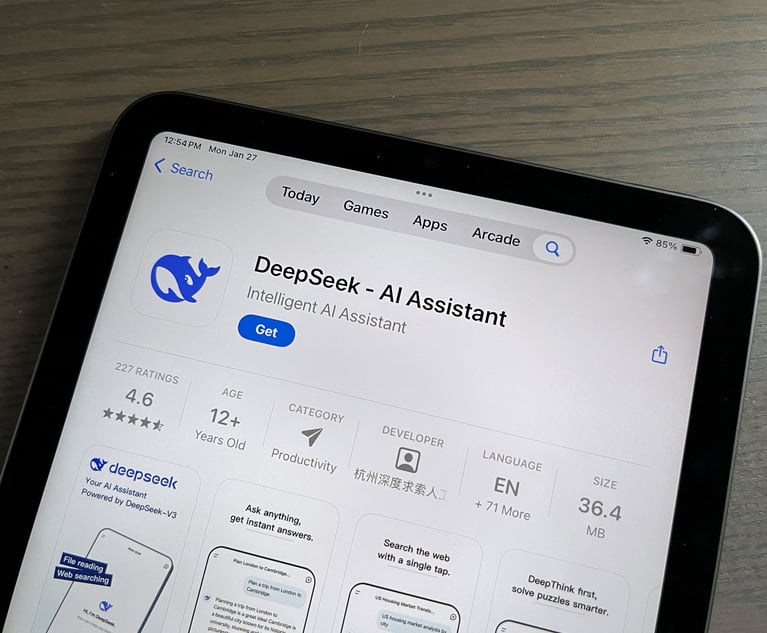 Credit: aniqpixel/Adobe Stock
Credit: aniqpixel/Adobe Stock An Optimistic View of AI's Potential Impact on the Legal Profession
"The legal profession is demanding, often resulting in high stress and an imbalance between work and personal life. By automating routine and time-consuming tasks, AI can help to lessen workload and associated pressures."
June 30, 2023 at 04:05 PM
7 minute read
In the late 1970s, legal research databases like Westlaw and LexisNexis hit the market, and with their emergence came a flurry of predictions about the de-skilling of the legal profession. Pundits speculated that reliance on these technologies might lead to a decrease in critical thinking skills among lawyers, not to mention a big reduction in their capacity to bill hours.
As the internet age dawned, this discourse gained momentum. The easy availability of legal information online spurred fears of the "commoditization" of legal services. As legal information became more accessible, the argument went, the need for lawyers might shrink. Individuals and businesses, it was surmised, could access legal information and conduct basic legal tasks on their own.
This content has been archived. It is available through our partners, LexisNexis® and Bloomberg Law.
To view this content, please continue to their sites.
Not a Lexis Subscriber?
Subscribe Now
Not a Bloomberg Law Subscriber?
Subscribe Now
NOT FOR REPRINT
© 2025 ALM Global, LLC, All Rights Reserved. Request academic re-use from www.copyright.com. All other uses, submit a request to [email protected]. For more information visit Asset & Logo Licensing.
You Might Like
View All
The Time Is Now for Employers to Assess Risk of Employees’ Use of DeepSeek
4 minute read
Indian Law Firm Cyril Amarchand Rolls Out AI Strategy, Adopts Suite of AI Tools


Law Firms Look to Gen Z for AI Skills, as 'Data Becomes the Oil of Legal'
Trending Stories
- 1Snap Paid $63M in Fees to 2 Am Law 200 Firms in '24
- 2Lawyers Across Political Spectrum Launch Public Interest Team to Litigate Against Antisemitism
- 3Jones Day Names New Practice Leaders for Antitrust, Business and Tort Litigation and Latin America
- 4Russia’s Legal Sector Is Changing As Sanctions Take Their Toll
- 5Government Contracting Clients Look to Firms to Stay on Top of Trump Policy Changes
Who Got The Work
J. Brugh Lower of Gibbons has entered an appearance for industrial equipment supplier Devco Corporation in a pending trademark infringement lawsuit. The suit, accusing the defendant of selling knock-off Graco products, was filed Dec. 18 in New Jersey District Court by Rivkin Radler on behalf of Graco Inc. and Graco Minnesota. The case, assigned to U.S. District Judge Zahid N. Quraishi, is 3:24-cv-11294, Graco Inc. et al v. Devco Corporation.
Who Got The Work
Rebecca Maller-Stein and Kent A. Yalowitz of Arnold & Porter Kaye Scholer have entered their appearances for Hanaco Venture Capital and its executives, Lior Prosor and David Frankel, in a pending securities lawsuit. The action, filed on Dec. 24 in New York Southern District Court by Zell, Aron & Co. on behalf of Goldeneye Advisors, accuses the defendants of negligently and fraudulently managing the plaintiff's $1 million investment. The case, assigned to U.S. District Judge Vernon S. Broderick, is 1:24-cv-09918, Goldeneye Advisors, LLC v. Hanaco Venture Capital, Ltd. et al.
Who Got The Work
Attorneys from A&O Shearman has stepped in as defense counsel for Toronto-Dominion Bank and other defendants in a pending securities class action. The suit, filed Dec. 11 in New York Southern District Court by Bleichmar Fonti & Auld, accuses the defendants of concealing the bank's 'pervasive' deficiencies in regards to its compliance with the Bank Secrecy Act and the quality of its anti-money laundering controls. The case, assigned to U.S. District Judge Arun Subramanian, is 1:24-cv-09445, Gonzalez v. The Toronto-Dominion Bank et al.
Who Got The Work
Crown Castle International, a Pennsylvania company providing shared communications infrastructure, has turned to Luke D. Wolf of Gordon Rees Scully Mansukhani to fend off a pending breach-of-contract lawsuit. The court action, filed Nov. 25 in Michigan Eastern District Court by Hooper Hathaway PC on behalf of The Town Residences LLC, accuses Crown Castle of failing to transfer approximately $30,000 in utility payments from T-Mobile in breach of a roof-top lease and assignment agreement. The case, assigned to U.S. District Judge Susan K. Declercq, is 2:24-cv-13131, The Town Residences LLC v. T-Mobile US, Inc. et al.
Who Got The Work
Wilfred P. Coronato and Daniel M. Schwartz of McCarter & English have stepped in as defense counsel to Electrolux Home Products Inc. in a pending product liability lawsuit. The court action, filed Nov. 26 in New York Eastern District Court by Poulos Lopiccolo PC and Nagel Rice LLP on behalf of David Stern, alleges that the defendant's refrigerators’ drawers and shelving repeatedly break and fall apart within months after purchase. The case, assigned to U.S. District Judge Joan M. Azrack, is 2:24-cv-08204, Stern v. Electrolux Home Products, Inc.
Featured Firms
Law Offices of Gary Martin Hays & Associates, P.C.
(470) 294-1674
Law Offices of Mark E. Salomone
(857) 444-6468
Smith & Hassler
(713) 739-1250








